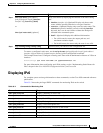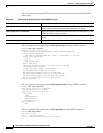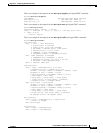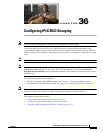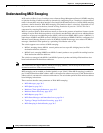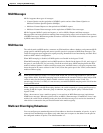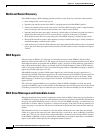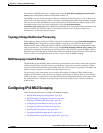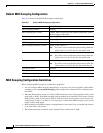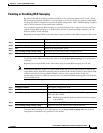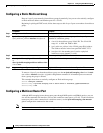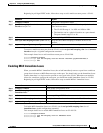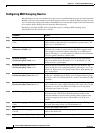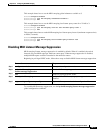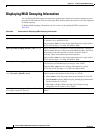
36-5
Catalyst 2960 and 2960-S Switch Software Configuration Guide
OL-8603-09
Chapter 36 Configuring IPv6 MLD Snooping
Configuring IPv6 MLD Snooping
The number of MASQs generated is configured by using the ipv6 mld snooping last-listener-query
count global configuration command. The default number is 2.
The MASQ is sent to the IPv6 multicast address for which the Done message was sent. If there are no
reports sent to the IPv6 multicast address specified in the MASQ during the switch maximum response
time, the port on which the MASQ was sent is deleted from the IPv6 multicast address database. The
maximum response time is the time configured by using the ipv6 mld snooping
last-listener-query-interval global configuration command. If the deleted port is the last member of the
multicast address, the multicast address is also deleted, and the switch sends the address leave
information to all detected multicast routers.
Topology Change Notification Processing
When topology change notification (TCN) solicitation is enabled by using the ipv6 mld snooping tcn
query solicit global configuration command, MLDv1 snooping sets the VLAN to flood all IPv6
multicast traffic with a configured number of MLDv1 queries before it begins sending multicast data
only to selected ports. You set this value by using the ipv6 mld snooping tcn flood query count global
configuration command. The default is to send two queries. The switch also generates MLDv1 global
Done messages with valid link-local IPv6 source addresses when the switch becomes the STP root in the
VLAN or when it is configured by the user. This is same as done in IGMP snooping.
MLD Snooping in Switch Stacks
The MLD IPv6 group and MAC address databases are maintained on all switches in the stack, regardless
of which switch learns of an IPv6 multicast group. Report suppression and proxy reporting are done
stack-wide. During the maximum response time, only one received report for a group is forwarded to the
multicast routers, regardless of which switch the report arrives on.
The election of a new stack master does not affect the learning or bridging of IPv6 multicast data;
bridging of IPv6 multicast data does not stop during a stack master re-election. When a new switch is
added to the stack, it synchronizes the learned IPv6 multicast information from the stack master. Until
the synchronization is complete, data ingressing on the newly added switch is treated as unknown
multicast data.
Configuring IPv6 MLD Snooping
These sections describe how to configure IPv6 MLD snooping:
• Default MLD Snooping Configuration, page 36-6
• MLD Snooping Configuration Guidelines, page 36-6
• Enabling or Disabling MLD Snooping, page 36-7
• Configuring a Static Multicast Group, page 36-8
• Configuring a Multicast Router Port, page 36-8
• Enabling MLD Immediate Leave, page 36-9
• Configuring MLD Snooping Queries, page 36-10
• Disabling MLD Listener Message Suppression, page 36-11



